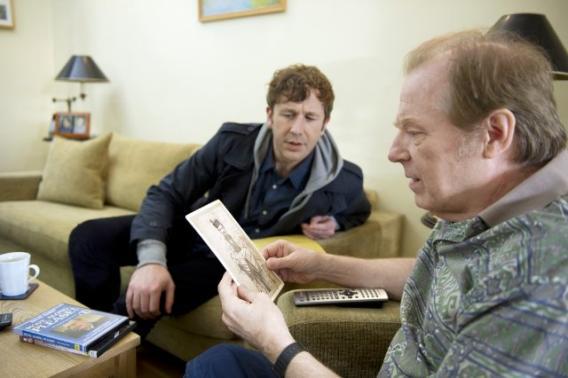After a long and surprisingly successful career as a creator of largely improvised movies, Christopher Guest returns to television this Sunday with Family Tree, a new HBO comedy about genealogy.
That’s not to say that Guest is doing for family history what he once did for clapped-out rock bands, community theater, dog shows, folk music, or the Oscars. Although the eight-part series follows Tom Chadwick (Chris O’Dowd in charming loser mode) as he tries to learn more about his ancestors, its real subject is the international family of comedy.
O’Dowd’s role is that of an amiable host. Tom is a sweet guy who’s been dumped by his girlfriend and laid off from his job, the only normal person in a world full of weirdos. His parents divorced when he was 9, and he spent the next nine years with his mother in Ireland before returning to London and the rest of his family, an absence that explains his relative sanity and his Irish accent. His sister, Bea (Nina Conti), was traumatized at an early age by the sight of a masturbating puffin, and now communicates with the help of a hand puppet, specifically a monkey called Monk. His father, Keith (Michael McKean), a former Yeoman of the Guard, sits at home watching television, tinkering with his hopeless inventions, and eating the bizarre cooking of his Moldovan wife, Luba (Lisa Palfrey).
At a family dinner, Tom learns that a great aunt has left him a trunk full of strange objects, and with nothing else to occupy his time, he sets out to learn more about the family members they belonged to. This provides Tom with a fine excuse to spend time with the species homo oddballicus as he visits with Afrikaaner antiques dealers, loony historians, theater queens, former boxers, and gruff country folk.
Tom is the show’s straight man and, at times, a proxy for the viewer—as when he tries, always unsuccessfully, to save his best pal Pete Stupples (Tom Bennett), a man-child who hasn’t matured one bit since their days at elementary school, from abject humiliation. Pete is the kind of straight white guy who finds himself in full rasta gear exchanging faux-Jamaican patois with an actually Jamaican boxing instructor or interrogating an ancient lesbian about her nonexistent youthful dalliances with men. He’s a kinder, gentler David Brent: clueless, oblivious, but ultimately harmless.
If Pete represents the Ricky Gervais/Sacha Baron Cohen school of excruciation humor, Tom’s sister Bea is repping for insult comedy. True, the constant presence of Monk, the hand puppet, brings to mind mild-mannered Chuck Campbell and his abrasive ventriloquist’s dummy Bob from the 1970s U.S. sitcom Soap. But thanks to the lack of language restrictions on HBO—and on the BBC, where the show will air in the U.K.—Monk can be far ruder than Bob ever was. And there’s very little difference between Bea Chadwick’s fictional relationship with Monk and Nina Conti’s real relationship with Monk: One of Family Tree’s greatest services is bringing some of the more obscure strands of British comedy to an American audience.
Among those distant branches of British humor are the kinds of TV sitcoms that Keith Chadwick spends his days watching. He’s obsessed with Move Along Please! and There Goes the Neighborhood—and we’re shown extended snatches of these shows. Don’t bother looking them up in IMDB—they’re fictional. But they bear more than a passing resemblance to The Thin Blue Line and Goodness Gracious Me, respectively. We’re also treated to a short film showing faux-historical footage of great British music-hall acts, a costume horse derby that recalls a scene from Monty Python, and an outdoor adventure that reads like a Benny Hill outtake, all wrapped up in the kind of gentle creation that video stores used to file under the heading of “Britcoms.” Oh, and the whole series is told in the mockumentary style that’s now associated with shows like The Office, Parks and Recreation, or Modern Family but which Guest pioneered in his movie mockumentaries.
In the last four episodes of the season, which I haven’t yet seen, the action moves to America, and more of Guest’s regular collaborators show up as members of Tom Chadwick’s far-flung clan. But the first half of the season might be tough-going for viewers unschooled in hard-core British humor. Christopher Guest is himself an international co-production—his mother was American and his father a British baron—so I presume he laughed when Pete told Tom that he met his latest girlfriend “at an over-40s night in Catford.” I don’t know how many other American viewers will appreciate the absurdity of finding love at such an event in that rough South London neighborhood. But if they stick around, they’ll get a hell of an education in British comedy tropes.
